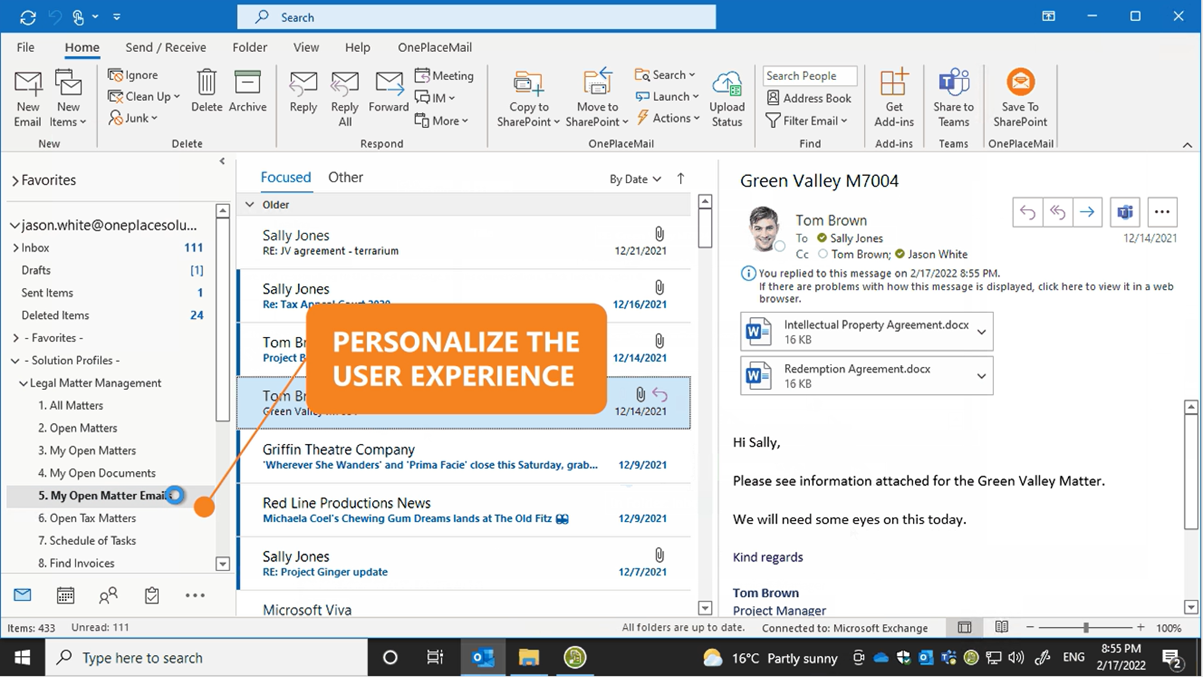Top seven benefits of Microsoft 365 for legal matter management

This is the latest article in a series discussing what is possible to achieve by using the Microsoft 365 platform for legal matter management in conjunction with the OnePlace Solutions products. Over the coming weeks the following articles will be published, revisit the blog:
- Top seven benefits of Microsoft 365 for legal matter management
- Greater collaboration with Microsoft Teams and legal matter management
- Seamlessly integrate legal matter management with Outlook
- Legal matters information and records compliance
- Provisioning Microsoft 365 legal matters
- Personalizing legal matter management in Microsoft 365 for greater productivity
Managing legal matters requires more than a solid grasp of the law and attention to detail. It also requires you to effectively handle dozens, if not hundreds, of documents and pieces of information. That’s why many legal firms and corporate legal departments invest in bespoke legal matter management solutions.
However, law firms and corporate legal departments could be missing a significant opportunity by not considering their existing Microsoft 365 platform, helping to save on software licensing costs, improve the way they manage legal matters, and gain greater governance and visibility over the documents involved in various matters.
The Microsoft 365 platform can be used by law firms and corporate legal teams for document management, email management, and more effective collaboration to manage legal matters. And, if you’re already using Microsoft 365, including Microsoft applications such as Microsoft Teams, you could already be paying for a comprehensive platform for your legal matter management.
 Personalize the User Experience with OnePlace Solutions
Personalize the User Experience with OnePlace Solutions
There are seven reasons Microsoft 365 is the ideal platform for your legal matter management:
1. Users are already familiar with the Microsoft platform
Microsoft 365 is the most widely used enterprise software suite. Most law firms and corporate legal departments are well-versed in using Microsoft Word, Excel, PowerPoint, and Outlook, and many also use Microsoft Teams, SharePoint, and even Power BI and workflows. Therefore, employees are more productive using these applications for legal matter management, saving the learning and complexity of using a separate, bespoke system. This reduces the need for and cost of additional training and ensures new staff members can get up and running sooner.
Microsoft 365 has document management and team collaboration capabilities at its core, providing a consistent and powerful platform for legal teams to remain productive. Microsoft 365 offers comprehensive integration capabilities and partner solutions to further streamline business processes.
2. Microsoft 365 security backed by Azure AD puts you in control
Securely managing information in the cloud is essential for business continuity. The Microsoft Azure and Microsoft 365 platforms are enterprise-ready, with security at their core to help protect your data and maintain compliance.
3. License and ongoing administration costs can be streamlined
If you’re already licensed and using elements of Microsoft 365, then you already have someone administering it, handling your identity management and security, devices, support, and more.
A point solution for legal matter management requires additional licensing and similar administration, adding to your costs and complexity.
4. Vendor investment in an enterprise-ready platform
Many law firms and corporate legal departments build processes and workflows around their legal matter management software only to find that the software isn’t updated regularly or, worse, is eventually phased out. Microsoft continues to invest in the Microsoft 365 platform, delivering a consistent approach enterprise-wide for information management, governance and records compliance. This means information and records compliance for legal matters is managed in a consistent and effective manner alongside other enterprise-wide content.
5. Upgrades are delivered automatically
Organizations that use on-premises or bespoke solutions often need to set aside time to upgrade their solution, with all the costs and risks that come with that type of monolithic upgrade process. As a cloud-based platform, Microsoft 365 is automatically upgraded so users can access the latest security updates and most modern features without the risk or cost of an on-premises upgrade.
6. Collaboration and automation are second to none
Microsoft 365 is, at its heart, a collaboration and information management platform. Microsoft Teams builds on this, empowering legal teams to work together more collaboratively, helping meet the demands of modern legal matter management. This provides exceptional value for law firms and corporate legal departments because they can use these collaboration capabilities to remain productive even when working remotely, keeping legal matters flowing. Moreover, many workflows can be automated to a large extent, reducing the manual load and the attendant possibility of errors. Collaboration and automation at scale can help law firms and corporate legal departments work more effectively.
7. Integration with Microsoft Outlook
Remaining productive from Microsoft Outlook when engaging with legal matters is critical. Simplifying the process to capture, classify and access email and documents from a familiar Microsoft Outlook environment is a must.
Managing the flow of documents and information throughout a legal matter can take up valuable time if integrations between Microsoft Outlook and the legal matter management system aren’t tight. Using the Microsoft 365 platform to manage legal matters means lawyers, paralegals, and other team members can benefit from all the Microsoft 365 capabilities while tightly integrating with Microsoft Outlook and Teams to deliver a modern legal matter management solution.
With these seven benefits in mind, the question quickly changes from “Why should we use Microsoft 365 for legal matter management?” to “Why aren’t we using Microsoft 365 for legal matter management?”
Microsoft 365 is a powerful platform, delivering enterprise-wide consistency for better collaboration, information management, and governance; however, it is not an out-of-the-box, dedicated legal matter management solution.
For most law firms and corporate legal departments, the key barrier to using Microsoft 365 as a legal matter management platform is simply a lack of inherent know-how. This blog series will provide information and guidance on how to use Microsoft 365 for modern legal matter management to deliver workflow efficiencies, cost savings, and greater productivity.
OnePlace Solutions enables people in business to do more simply. To learn more about how OnePlace Solutions can help your law firm or legal department work more effectively without investing in expensive bespoke solutions, or help your organization leverage Microsoft 365 as a platform for legal matter management contact the team today.
Interested in this series?
Latest news & blogs
Boost productivity and compliance with the new OnePlace Mail Send and Save feature
Ideagen OnePlace Mail continues to innovate for Microsoft 365-driven organisations, and the new Send and Save feature is a game changer for anyone serious about effective email and record management. This enhancement empowers users to efficiently capture business-critical correspondence in SharePoint or Teams-right at the point of sending-without extra steps or hassle.
Webinar: Be Copilot ready - Simplify work processes and improve productivity in Microsoft 365
Join us for an exclusive webinar designed for Office 365 users looking to streamline operations and boost efficiency.
DWConference 25
Join us at the Digital Workplace Conference for two days of learning about tools in the Digital Workplace. Immerse yourself in knowledge, expertise and experience and challenge your thinking by acquiring new skills and building your network.
Auckland, New Zealand | 18-19 March






